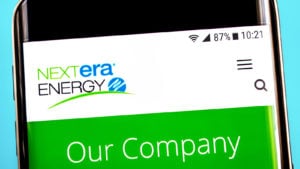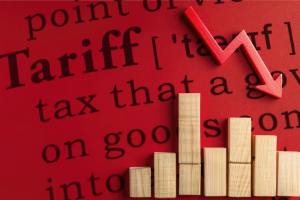
The macroeconomic picture that held clean energy stocks lower in 2023 is shifting. High-interest rates have been a detriment to multiple sectors this year, including solar energy and electric vehicles (EVs) — among others.
With the Federal Reserve telegraphing multiple rate cuts in 2024, the landscape is quickly shifting. Leading funds and firms are no longer remaining on the sidelines and have initiated positions in clean energy. Investment bank Jefferies (NYSE:JEF) recently started covering several solar stocks, giving First Solar (NASDAQ:FSLR) and Enphase Energy (NASDAQ:ENPH) ratings.
NextEra Energy (NEE)

Oftentimes, there is a strong investment case for NextEra Energy (NYSE:NEE) and its stock. The company is a unique hybrid comprising a leading utility company and a leading solar and wind company.
In recent months and weeks, bond yields were very high, making utility firms and their dividends suddenly much less attractive. I thought then that NextEra Energy was a strong contrarian pick. Its dividend yield was above 3% then and continues to be. Combined with the upside in its share price, it was more attractive than bonds.
I believe NextEra Energy continues to be a strong pick at this moment for different reasons. Now, the company makes more sense in relation to the cyclical shifts underfoot. Green energy stocks are coming back into focus, as evidenced by moves like that from Jefferies.
All the while, NextEra Energy has continued to deliver earnings above consensus and analysts’ ranges. There was arguably more exciting growth in other clean energy stocks, but few are going to provide as stable a source of income and upside as NEE shares.
Albemarle (ALB)

In order to take a bullish view on Albemarle (NYSE:ALB) heading into 2024, investors will need a contrarian’s optimism.
The reasons underpinning a bearish take are clear and have been evident for several months. Prices for battery-grade lithium carbonate have collapsed in China by roughly 75%. The EV sector is going through all kinds of its own troubles otherwise. The overall consensus from some leading names, including Goldman Sachs (NYSE:GS) is that early optimism in the sector led to oversaturation. GS itself doesn’t see the market bottoming out until 2025.
Meanwhile, other analysts point out they are reasons for optimism. One analyst noted there is still projected to be a shortfall in lithium production in order to reach net zero goals by 2050.
Albemarle is the biggest lithium producer globally. Its shares are somewhere around $35 under the consensus target price Wall Street is expecting. Those shares have also trended quickly upward in the last few days following the Federal Reserves rate decision on Dec. 13. Even if Goldman Sachs is right and the market doesn’t bottom until 2025, rate cuts in 2024 should still spur Albemarle’s shares higher due to decreased lending costs.
Array Technologies (ARRY)

Array Technologies (NASDAQ:ARRY) is one of the better solar stocks investors should be considering heading into 2024. The company produces and manufactures ground mounting systems that optimally angle solar panels toward the sun.
I think there are two very important reasons investors should consider ray technologies at this point. First of all, from a fundamental perspective, the company is doing well. While revenue decreased in the third quarter to $350 million year-over-year, gross profit rose 14%. During the first nine months of 2022, the company experienced a loss from operations of $34.5 million but turned that into a gain during the same period in 2023 to $147.4 million. The fundamental case for investment in ARRY stock is obvious.
It’s also very evident the expectation of lower interest rates in 2024 will benefit the company. During the third quarter, the company paid more than $13 million in interest expenses. A year earlier, that expense was below $9 million. Investors should fully expect interest expenses will decline by this time next year.
On the date of publication, Alex Sirois did not hold (either directly or indirectly) any positions in the securities mentioned in this article. The opinions expressed in this article are those of the writer, subject to the InvestorPlace.com Publishing Guidelines.






